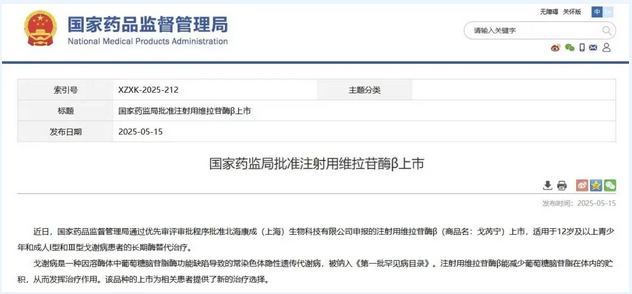On May 15, 2025, velaglucerase beta for injection (CAN103), an innovative therapeutic drug for Gaucher disease developed through Phase I/II clinical trials led by PUMCH, received marketing approval from the National Medical Products Administration (NMPA) of China. This Class 1 innovative drug represents China's first domestically developed long-term enzyme replacement therapy for adolescents aged 12 years and older and adults with Type I and Type III Gaucher disease, capable of completely replacing similar imported products.

▲NMPA approval for velaglucerase beta for injection
Gaucher disease is a lysosomal storage disorder caused by hereditary enzyme deficiency that leads to progressive multi-organ involvement, skeletal pathology, and can even be life-threatening. It was included in China's First Catalog of Rare Diseases in 2018. Enzyme replacement therapy (ERT) with recombinant human glucocerebrosidase is the standard treatment for Gaucher disease, demonstrating significant efficacy in improving patients' major non-neurological symptoms and quality of life. However, the prohibitively high treatment costs have consistently limited access to therapy for patients both domestically and internationally.
The Phase I/II clinical trial for Gaucher disease, including the extension phase, enrolled a total of 35 patients. Dr. Han Bing, chief physician in PUMCH's Department of Hematology, in collaboration with Associate Research Fellow Liu Hongzhong from the Phase I Clinical Ward of the Clinical Pharmacology Center, led their team in enrolling and treating more than half of the trial participants (18 patients), while conducting efficacy and safety evaluation visits.
Trial results demonstrated that the CAN103 60 U/kg dosage group achieved significant improvement in clinical symptoms for both pediatric and adult subjects, with confirmed therapeutic efficacy. Efficacy showed dose-dependent correlation, and subjects receiving lower doses also experienced varying degrees of clinical benefits. Through maintenance therapy, subjects achieved sustained long-term benefits. Regarding safety, subjects generally demonstrated good safety and tolerability across different CAN103 dose levels. From safety data spanning up to 2 years, no correlation was observed between adverse event incidence and investigational drug dosage. Both pediatric and adult subjects with long-term drug administration showed favorable risk-benefit ratios.
From the enrollment and treatment of the first patient in July 2022, through on-site inspection by the Center for Food and Drug Inspection of NMPA in February 2025, to final drug approval in May 2025, PUMCH has played an indispensable role in rare disease drug development all along. Dr. Han Bing expressed hope that the marketing of velaglucerase beta for injection will provide a more attractive treatment option for patients with Gaucher disease.
Written by Han Bing, Liu Hongzhong, and Dong Jingge
